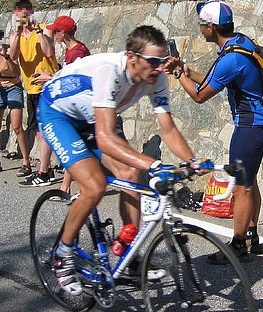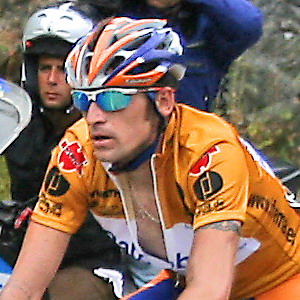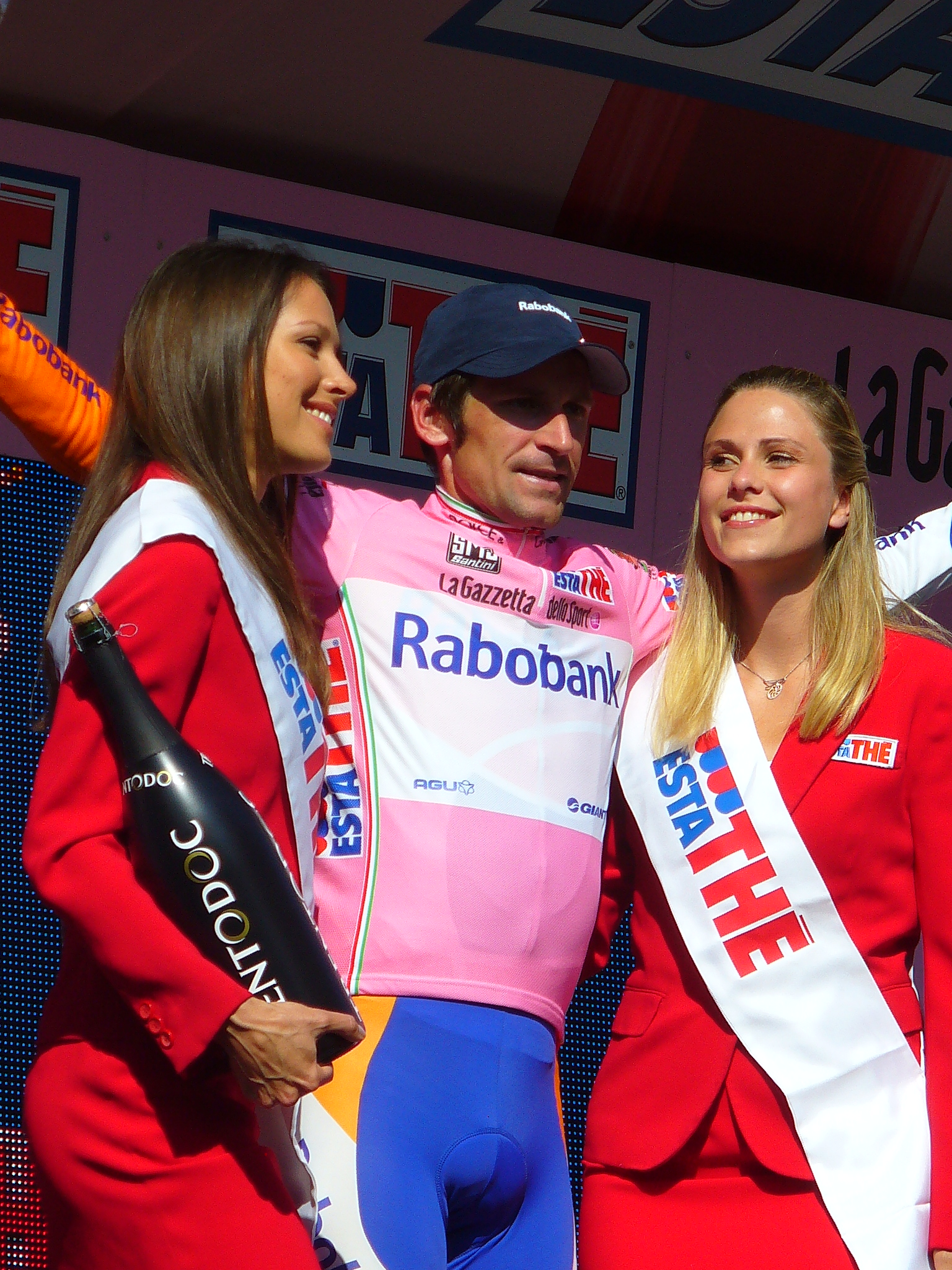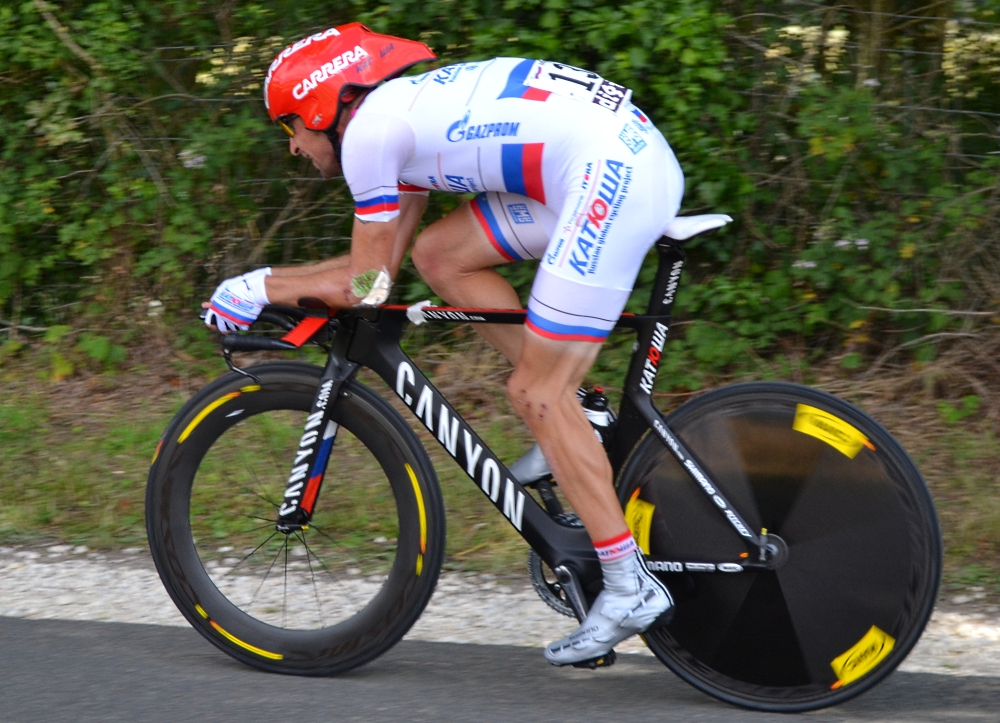1. Overview
Denis Nikolayevich Menchov (Денис Николаевич МеньшовDenis Nikolayevich MenchovRussian) is a former Russian professional road bicycle racer who competed from 2000 to 2013. Renowned as a versatile general classification rider, he excelled as both a climber and an accomplished time trialist. His career was marked by significant victories in Grand Tours, including the overall win at the 2007 Vuelta a España and the centenary 2009 Giro d'Italia. He also achieved a podium finish at the Tour de France, initially placing third in 2010 and later being upgraded to second. However, his career was also overshadowed by doping controversies, leading to his disqualification from the 2009, 2010, and 2012 editions of the Tour de France due to adverse biological passport findings, which raised questions about sports ethics and fair competition.
2. Career
Denis Menchov's professional cycling career spanned over a decade, during which he developed from a promising young talent into a Grand Tour contender, achieving significant victories before his career concluded amidst doping revelations.
2.1. Early Career and Debut
Born in Oryol, Russia, Menchov began his cycling journey at the age of 11 in 1989 at a local cycling school. His early talent was recognized, leading to his recruitment by CSKA Moscow (a military sports club) in 1993, and he later joined CSKA-Lada-Samara. Despite being underage, he won an adult stage race in Sochi in 1996, showcasing his potential. He continued to achieve success in various local and regional stage races across Russia and Europe. In May 1998, his overall victory at the Ronde de l'Isard in France caught the attention of Banesto's team manager, José Miguel Echavarri.
Menchov joined Banesto's amateur team in 1999 and made his professional debut with the same team in 2000. His first notable success came in 2001 when he won the Tour de l'Avenir, a prestigious stage race for young professionals, which brought him significant attention. The following year, he secured a stage win in the Critérium du Dauphiné Libéré, specifically on the challenging Mont Ventoux. In 2003, Menchov achieved a breakthrough performance by finishing 11th in the Tour de France and earning the young rider classification (Maillot Blanc). The year 2004 marked his most successful period with Banesto, as he won the overall title at the Tour of the Basque Country, secured a stage win in the Vuelta a Aragón, a stage in Paris-Nice, and his first Grand Tour stage victory on stage five of the 2004 Vuelta a España, from Zaragoza to Morella.
2.2. Banesto (2000-2004)

During his tenure with Banesto, Menchov steadily built his reputation as a promising all-rounder. After his professional debut in 2000, he quickly demonstrated his capabilities. His victory at the Tour de l'Avenir in 2001 highlighted his potential as a future Grand Tour contender. He continued to hone his skills, securing a stage win in the Critérium du Dauphiné Libéré in 2002. The 2003 Tour de France was a pivotal moment, where his 11th-place finish overall and triumph in the young rider classification showcased his ability to compete at the highest level. His final year with Banesto, 2004, was particularly fruitful, marked by his overall victory at the Tour of the Basque Country and stage wins in other significant races, including Paris-Nice and the Vuelta a España, signaling his readiness for greater challenges.
2.3. Rabobank (2005-2010)
Menchov's contract with Banesto expired in September 2004, leading him to join the Dutch Rabobank team for a two-year period, where he assumed the role of team captain following the departure of Levi Leipheimer. His first major challenge with Rabobank was the 2005 Tour de France, but a cold hampered his performance, resulting in an 85th-place finish.
His performance at the 2005 Vuelta was significantly more successful. He won the opening time trial in Granada and the stage nine time trial to Lloret de Mar, wearing the leader's jersey for several days. He finished second overall behind Roberto Heras, but Heras was later disqualified for EPO doping. Menchov was initially awarded the official win of the 2005 Vuelta, along with the event's Combined Classification. However, the title was controversially returned to Heras in 2012 by the Spanish Supreme Court due to irregularities in the doping test procedures.
In the 2006 Tour de France, Menchov secured a stage victory on the mountainous stage 11 from Tarbes to Aran Valley-Pla-de-Beret, winning a sprint against Leipheimer and Floyd Landis. He initially held third place overall but dropped to sixth in the Alps during the final week. He later moved up to fifth overall following the disqualification of race winner Floyd Landis.

Menchov's 2007 Tour de France campaign ended prematurely when he abandoned on stage 17, the day after his teammate Michael Rasmussen was dismissed from Rabobank due to doping-related issues. Despite this setback, he achieved his second Grand Tour victory later that year at the Vuelta a España. After performing strongly in the stage 8 time trial, he took the overall lead on stage 9 and won the mountainous stage 10 at the Arcalis ski resort. He calmly defended his lead against rivals like Carlos Sastre, reminiscent of Miguel Indurain's riding style, ultimately securing the overall title, the mountains classification, and the combination classification. He had also won the points classification in the Volta a Catalunya and finished fourth overall in the Critérium du Dauphiné Libéré earlier that season.
In 2008, Menchov focused on the Tour de France and did not defend his Vuelta title. He finished fifth overall in the Giro d'Italia, where he was among the strongest climbers in the mountains but lost time in the individual time trial and team time trial. In the Tour de France, he initially finished fourth but was later upgraded to third overall after Bernhard Kohl was disqualified for doping.

The 2009 Giro d'Italia was another career highlight for Menchov. He won stage 5, a mountainous course, and stage 12, an individual time trial, which allowed him to seize the pink jersey (Maglia Rosa) from Danilo Di Luca. Despite a fierce battle with Di Luca in the subsequent mountain stages and a crash in the final kilometer of the last-stage time trial through Rome, Menchov held onto his lead, winning the overall title by 41 seconds over Di Luca. He was also awarded the points jersey after Di Luca's disqualification. Menchov expressed that this was his happiest and biggest victory, noting the significance of the centenary edition and even jokingly mentioned beating Lance Armstrong for the first time in a major race.
In the 2010 Tour de France, Menchov displayed consistent form despite battling bronchial issues. He avoided crashes in the chaotic early stages and maintained a strong position in the mountains, often riding in the shadows of Alberto Contador and Andy Schleck. In the crucial 52-kilometer individual time trial on the penultimate stage, Menchov delivered what he described as the "best race of my life," overtaking Samuel Sánchez to finish third overall. He was later retroactively upgraded to second place following Contador's doping-related disqualification. However, Menchov himself was later disqualified from this Tour de France, as well as the 2009 and 2012 editions, due to adverse biological passport findings that came to light after his retirement.
2.4. Geox-TMC (2011)
Following his time at Rabobank, Menchov transferred to Geox-TMC in late 2010, joining as a joint team leader alongside Carlos Sastre. This move meant he was replaced as Rabobank's leader by Robert Gesink. The 2011 season presented new challenges for Menchov, particularly when his team was not invited to the Tour de France, a significant blow given his focus on the race. He expressed deep disappointment, having trained throughout the winter with the Tour in mind.
Despite the setback, Menchov competed in the 2011 Giro, finishing eighth overall, a result he found unsatisfactory due to ongoing struggles with allergies and influenza. In July, during the Tour de France, which he missed for the first time since 2001, he participated in the Tour of Austria alongside Sastre, finishing fifth overall.
His most notable performance with Geox-TMC came at the 2011 Vuelta a España. Although he was not the designated team leader due to Sastre's good form and only one individual time trial, Menchov played a crucial role. The team had a poor start in the opening team time trial, losing over a minute to rivals, and Menchov faced mechanical issues, including three bike changes on stage 3. However, as his teammate Juan José Cobo emerged as a strong contender for the overall victory, Menchov transitioned into a powerful domestique. He provided critical support in the mountains, pulling the peloton and dropping rivals, significantly contributing to Cobo's overall win and Geox-TMC's team victory. Menchov himself finished a commendable fifth overall.
2.5. Katusha (2012-2013)

At the end of 2011, with the sudden dissolution of Geox-TMC and a change in leadership at the Russian team Katusha, Menchov finally joined a team from his home country for the 2012 season. However, 2012 proved to be a challenging year, with Menchov abandoning many early season races, including Paris-Nice, due to persistent health issues and a lack of proper adjustment.
Despite these struggles, he won the Russian national time trial crown, his first national championship title. He entered the Tour de France with high hopes, starting well with an eighth-place finish in the prologue. However, his health problems resurfaced, causing him to lose pace in the second week and ultimately finish 15th overall. He was later retroactively disqualified from the 2012 Tour following a post-retirement doping ban.
Menchov represented the Russian National Team at the 2012 Summer Olympics in London, competing in both the Olympic road race and the individual time trial, marking his final Olympic appearance. After the Olympics, he participated in the Vuelta a España, where he rode as an important domestique for Joaquim Rodríguez, who finished third overall. Menchov himself achieved a significant victory on the penultimate stage, stage 20, at Bola del Mundo, outsprinting Richie Porte. This stage win was particularly meaningful as it was his first individual race victory in over three years (excluding national championships) and came on one of the race's most difficult stages, bringing him immense joy and relief.
Menchov began the 2013 season with Katusha but announced his retirement from professional cycling in May of that year due to a persistent knee injury that had troubled him in recent years.
2.6. Post-Retirement Activities
After his retirement as a professional rider, Menchov returned to the sport in 2019, taking on the role of directeur sportif for the UCI Pro-Continental team Gazprom-RusVelo.
3. Major Achievements and Awards
Denis Menchov's career was highlighted by significant victories and consistent performances in the world's most prestigious cycling races, particularly the Grand Tours, though some of his results were later affected by doping-related disqualifications.
3.1. Grand Tours
Menchov was a formidable presence in the Grand Tours, demonstrating his strength in both climbing and time trialing. His most significant overall victories include:
- Vuelta a España (initially awarded, later returned to Heras in 2012)
- Vuelta a España
- Giro d'Italia
He also achieved numerous stage wins across all three Grand Tours:
- Vuelta a España: 5 stage wins
- Tour de France: 1 stage win
- Giro d'Italia: 2 stage wins
His Grand Tour general classification results are summarized below:
| Grand Tour | 2000 | 2001 | 2002 | 2003 | 2004 | 2005 | 2006 | 2007 | 2008 | 2009 | 2010 | 2011 | 2012 | 2013 |
|---|---|---|---|---|---|---|---|---|---|---|---|---|---|---|
Giro d'Italia | - | - | - | - | - | - | - | - | 5 | 1 | - | 7 | - | - |
Tour de France | - | 47 | 93 | 11 | DNF | 85 | 5 | DNF | 3 | 51 | 3 | - | 15 | - |
/ Vuelta a España | - | - | - | - | DNF | 2 | DNF | 1 | - | - | 41 | 5 | 54 | - |
| Major stage race general classification results | ||||||||||||||
| Race | 2000 | 2001 | 2002 | 2003 | 2004 | 2005 | 2006 | 2007 | 2008 | 2009 | 2010 | 2011 | 2012 | 2013 |
/ Paris-Nice | - | 53 | DNF | - | 12 | - | - | - | - | - | - | - | DNF | 14 |
| Tirreno-Adriatico | Did not contest during his career | |||||||||||||
Volta a Catalunya | - | - | - | - | - | - | 9 | 3 | - | - | DNF | 109 | 11 | DNF |
Tour of the Basque Country | - | - | - | 36 | 1 | 11 | DNF | - | - | - | - | - | - | - |
/ Tour de Romandie | - | - | - | - | - | 3 | - | 54 | 4 | 11 | 2 | 14 | DNF | - |
Critérium du Dauphiné | DNF | 7 | 6 | 39 | - | 24 | 6 | 4 | - | - | 25 | - | 42 | - |
| - | Did not compete |
|---|---|
| DNF | Did not finish |
DSQ = Disqualified
3.2. Other Stage Races
Beyond the Grand Tours, Menchov achieved notable success in various stage races:
- 1st Overall Tour de l'Avenir (2001)
- 1st Overall Tour of the Basque Country (2004)
- 1st Overall Vuelta a Murcia (2009)
- 2nd Overall Tour de Romandie (2010)
- 3rd Overall Tour de Romandie (2005)
- 3rd Overall Volta a Catalunya (2007)
- 4th Overall Critérium du Dauphiné Libéré (2007)
- 5th Overall Tour of Austria (2011)
- 6th Overall Critérium du Dauphiné Libéré (2002, 2006)
- 7th Overall Critérium du Dauphiné Libéré (2001)
He also secured stage wins in races such as Critérium du Dauphiné Libéré (2002, 2006), Paris-Nice (2004), Vuelta a Aragón (2004), Volta a Catalunya (2007), and Vuelta a Murcia (2011).
3.3. Other Races and Awards
Menchov's career also included successes in one-day races and national championships:
- 1st Clásica a los Puertos de Guadarrama (2003)
- 1st Time trial, National Road Championships (2012)
- Young rider classification, Tour de France (2003)
- Combination classification, Vuelta a España (2005)
- Mountains classification, Vuelta a España (2007)
- Combination classification, Vuelta a España (2007)
- Points classification, Giro d'Italia (2009)
4. Doping and Disqualifications
Denis Menchov's career was significantly impacted by doping allegations and subsequent disqualifications, which raised serious questions about the integrity of his achievements and the sport as a whole.
On July 10, 2014, the Union Cycliste Internationale (UCI) announced that Menchov had been banned for a period of two years, effective until April 9, 2015. This sanction was a result of adverse findings in his biological passport, a system designed to monitor an athlete's biological markers over time for indirect evidence of doping. Consequently, Menchov was retroactively disqualified from his results in the 2009 Tour de France, 2010 Tour de France, and 2012 Tour de France. This meant he was stripped of his third-place finish (later upgraded to second) in the 2010 Tour de France, a significant blow to his career record.
Further details emerged on January 22, 2015, when the United States Anti-Doping Agency (USADA) released its reasoned decision in the case of Dr. Geert Leinders, a former team doctor. This decision stated that Menchov had received blood transfusions during the 2005 Tour de France. While his 2005 Tour de France result (85th place) was not a top finish, this revelation provided direct evidence of doping practices during his career.
The situation surrounding his 2005 Vuelta a España victory also highlights the complexities of doping enforcement. Menchov was initially awarded the overall win after Roberto Heras was disqualified for EPO doping. However, in December 2012, the Spanish Supreme Court controversially reinstated Heras as the winner of the 2005 Vuelta, citing procedural irregularities in the doping control process. This decision meant that Menchov's first Grand Tour victory, initially awarded to him due to a doping infraction by a competitor, was ultimately revoked, further complicating his legacy.
Despite the disqualifications from the Tour de France, his overall victories in the 2007 Vuelta a España and the 2009 Giro d'Italia currently remain officially recognized.
5. Personal Life and Character
Denis Menchov, born in Oryol, Russia, displayed a quiet and reserved demeanor throughout his career, often described as private by his teammates. Before dedicating himself to cycling, he was passionate about soccer and enjoyed outdoor activities such as cross-country skiing, fishing, and hunting. He was also a diligent student, known for memorizing lengthy poems for his mother.
An anecdote from his early cycling days illustrates his dedication: his local cycling school coach recalled that Menchov, initially a highly promising student, became so engrossed in fishing during his first summer that he stopped attending practice. It was his grandmother who intervened, persuading him to refocus on cycling, a pivotal moment that his coach still vividly remembers. Even as a professional, he continued to enjoy hunting and fishing, clarifying that his interest lay in spending time in nature rather than the act of killing.
Menchov's reserved nature meant he was generally quiet around those he was not close to, leading teammates to describe him as "a good guy, but private." A rare public display of intense emotion occurred when he secured his overall victory at the 2009 Giro d'Italia; his director, Erik Breukink, remarked that he had "never seen Denis like that." However, by dinner that evening, Menchov had reportedly returned to his usual calm self.
When asked about his strengths and weaknesses in early 2007, Menchov identified his ability to "relax and not panic" as a strength, and "lack of experience" as a weakness. He held a high regard for experienced riders like Carlos Sastre, considering him a formidable rival in the mountains. By 2009, at 31, he felt he was steadily improving each year, believing that the age range of 32 to 35 would be his "perfect" period for performance.
He often faced criticism for his seemingly defensive riding style. To this, Menchov responded, "I am not a true climber or a time trial specialist. I have always ridden this way, and I am in a good situation now, so I think this is fine. Everyone just rides their own way." Among races outside the Grand Tours, he particularly enjoyed the Clásica de San Sebastián, where he often saw many acquaintances along the route, and Liège-Bastogne-Liège.
Observing Menchov's riding form provided insight into his technique. He maintained an ideal posture, tucking his head into his trapezius muscles, appearing flat and low from the front, with a distinctly square back from above. His upper body remained exceptionally stable during pedaling, which, while efficient, sometimes gave the impression of a lack of visible intensity or effort.
6. Influence and Legacy
Denis Menchov's influence and legacy in professional cycling are complex, shaped by his remarkable athletic achievements as a versatile Grand Tour contender and the controversies that later marked his career.
His journey began in a Russia still grappling with economic challenges, where his local cycling school in Oryol often lacked enough bicycles for all students. Menchov's early triumph in a local race on a used bicycle ignited his dream of becoming a professional road racer. This humble beginning was further highlighted by his transfer to Banesto's amateur team in 1999, for which Banesto compensated his previous team not with cash, but with bicycle parts worth 3.00 K EUR. His mother recalled that he sought "shelter and food, and some allowance" in Spain, as their team jerseys were often patched up. Menchov later contributed to his alma mater by donating equipment.
Throughout his professional career, Menchov maintained a strong connection to his Russian roots. Since 1999, he resided near Pamplona, Spain, during the racing season, but habitually spent the off-season and post-Tour de France vacations at his home in Oryol. He consistently expressed a desire to return to Russia permanently someday, and he and his family communicated exclusively in Russian, with his wife and children often returning to Oryol during the racing season.
His response to the controversial 2005 Vuelta a España outcome, where he was initially awarded the win after Roberto Heras's doping disqualification only for the title to be returned to Heras years later, was telling: Menchov commented that "Heras and I are both losers," reflecting the bitter taste left by the situation. In contrast, his comprehensive victory at the 2007 Vuelta a España, where he secured the overall, mountains, and combination classifications, was a testament to his undisputed dominance.
The 2009 Giro d'Italia victory held particular significance for Menchov. He described it as his "happiest victory" and the "biggest in my career," citing the race's 100th anniversary, high media attention, and strong field of competitors. He even light-heartedly mentioned that it was the "first time in 10 years I beat Lance Armstrong (laughs)." An amusing anecdote from the final podium ceremony of the 2009 Giro involved the playing of the wrong Russian national anthem (the "Patriotic Song" from the Boris Yeltsin era, not the current one). Menchov, however, stated he "didn't mind at all" because he was so happy. His wife also famously saved his dirty and torn time trial suit from the final stage, insisting it be kept as a souvenir.
Menchov's 2009 Tour de France campaign, which ended with him finishing 51st overall, was a stark contrast to his Giro success. He humorously remarked on his website that there was "nothing to remember" from that race, except that he "set a record for crashes. I hope no one breaks this record." His propensity for crashes in crucial moments, such as mountain attacks, time trials, and even twice in a single stage, led him to reflect on the inherent dangers of the sport. In an interview with a Russian newspaper, he pondered, "Why do cyclists have to suffer so many injuries? It's because they ride future vehicles on past roads (with poor road conditions)." This statement encapsulates a persistent challenge in professional cycling and highlights his pragmatic view of the sport's risks.
His unexpected decision to join Geox-TMC in 2010, rather than the Russian Katusha team, despite public speculation, was attributed by Menchov to a lack of formal offers and timely responses from Katusha. The Katusha director, Andrei Tchmil, cited economic reasons for their inability to secure Menchov.
Ultimately, Menchov's legacy is defined by his impressive Grand Tour victories and consistent high-level performances, showcasing his exceptional all-around abilities. However, the subsequent disqualifications due to doping findings, particularly from the Tour de France, cast a shadow over parts of his career, contributing to ongoing discussions within the cycling world about the sport's past and its efforts toward integrity.





